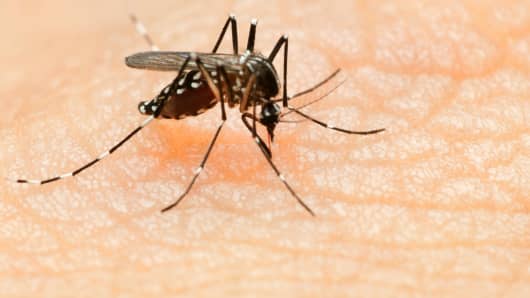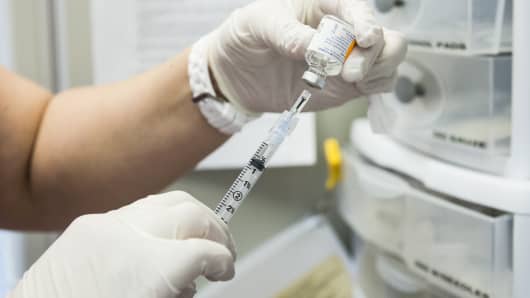
Source: CNBC
The rapid spread of the zika virus across the Americas has spurred research bodies and pharmaceutical companies to start the hunt for a cure, but the financial incentive and likely length of time for a vaccine to be developed are unclear.
Cases of the virus, which has appeared in countries across the Americas and the Caribbean, have already been reported among travelers returning to the U.S. An article in The Lancet medical journal this month warned that in wetter and warmer parts of the U.S., mosquitoes could carry the virus from infected travelers and spread it to other people.
According to researchers led by Kamran Khan of St.
Michael's Hospital, Toronto, about 200 million Americans — more than 60
percent of the U.S. population — live in areas of the country where
mosquitoes could spread zika during warmer months. A further 22.7
million people live in humid, subtropical parts of the country,
including southern Texas and Florida, which might support the spread of
zika all year around.
That, coupled with reports of a correlation between zika and birth defects and still-fresh memories of the recent ebola epidemic have spurred the Brazilian and U.S. governments to commit to working together to find a vaccine.
"There have been no reported attempts to make a vaccine for Zika virus to date. However, the sudden increase in incidence and the very real likelihood of further spread will focus attention on this problem and it is likely that work will begin on a vaccine," Andrew Easton, a professor of life sciences at England's University of Warwick, told CNBC via email on Wednesday.
Places with confirmed indigenous zika cases:
That, coupled with reports of a correlation between zika and birth defects and still-fresh memories of the recent ebola epidemic have spurred the Brazilian and U.S. governments to commit to working together to find a vaccine.
"There have been no reported attempts to make a vaccine for Zika virus to date. However, the sudden increase in incidence and the very real likelihood of further spread will focus attention on this problem and it is likely that work will begin on a vaccine," Andrew Easton, a professor of life sciences at England's University of Warwick, told CNBC via email on Wednesday.
Places with confirmed indigenous zika cases:
- Barbados, Bolivia, Brazil, Cape Verde, Colombia, Dominican Republic, Ecuador, El Salvador, French Guiana, Guatemala, Guadeloupe, Guyana, Haiti, Honduras, Martinique, Mexico, Panama, Paraguay, Puerto Rico, Saint Martin, Samoa, Suriname, Venezuela.
'Record time' for vaccine?
Work on a cure or preventive vaccine will build on the work
Brazil and the U.S. have already done together on eradicating another
mosquito-borne disease: Dengue fever.
No dengue vaccine is yet available, but the Brazilian minister of health, Marcelo Castro, has said he hopes a zika vaccine will be easier to develop than dengue as it has fewer biological variations.
The minister aims for a vaccination to be available in "record time" — but experts suggest that could be years away rather than months.
The director of the Butantan Institute, a Brazilian research body that is working on finding a vaccine, has warned that it will probably take three to five years, according to an Associated Press report.
No dengue vaccine is yet available, but the Brazilian minister of health, Marcelo Castro, has said he hopes a zika vaccine will be easier to develop than dengue as it has fewer biological variations.
The minister aims for a vaccination to be available in "record time" — but experts suggest that could be years away rather than months.
The director of the Butantan Institute, a Brazilian research body that is working on finding a vaccine, has warned that it will probably take three to five years, according to an Associated Press report.
"As zika virus belongs to a family of viruses for which we
have some information, there are some clues as to how to progress the
making of a vaccine," Easton told CNBC.
"But inevitably each virus has unique features that may slow down progress — we simply do not know enough to be entirely confident of success in a short time frame.
"Zika belongs to a family that includes dengue virus and West Nile virus and, in the case of dengue, attempts to generate a vaccine have so far been unsuccessful despite a huge effort over many years."
"But inevitably each virus has unique features that may slow down progress — we simply do not know enough to be entirely confident of success in a short time frame.
"Zika belongs to a family that includes dengue virus and West Nile virus and, in the case of dengue, attempts to generate a vaccine have so far been unsuccessful despite a huge effort over many years."
What financial incentives?
Investment in tropical diseases has been patchy over the
years due to the uncertain commercial prospects. However, the ebola
epidemic has highlighted how important it is for governments to
encourage research and development on new diseases on a systemic basis,
rather than as an ad-hoc response to outbreaks.
Some pharmaceutical giants have expressed interest in working on a zika vaccine, but have not yet fully committed.
"At this stage it is too early to be able to assess the possible market for a vaccine that may make the prospect interesting for a commercial organization. Most vaccines have been underwritten by governments because of the huge cost implications with uncertainty about a successful outcome," Easton told CNBC.
Nasdaq-listed Inovio Pharmaceuticals said last Friday that it would work with South Korea's GeneOne Life Science on a vaccine to treat and prevent zika. The two companies have a history of collaborating on vaccines against major emerging diseases, including ebola and MERS.
Some pharmaceutical giants have expressed interest in working on a zika vaccine, but have not yet fully committed.
"At this stage it is too early to be able to assess the possible market for a vaccine that may make the prospect interesting for a commercial organization. Most vaccines have been underwritten by governments because of the huge cost implications with uncertainty about a successful outcome," Easton told CNBC.
Nasdaq-listed Inovio Pharmaceuticals said last Friday that it would work with South Korea's GeneOne Life Science on a vaccine to treat and prevent zika. The two companies have a history of collaborating on vaccines against major emerging diseases, including ebola and MERS.
Then on Monday, GlaxoSmithKline said it was considering working on a vaccine, but warned that development typically took 10 to 15 years. Sanofi is also exploring developing a vaccine, according to Reuters.
However, U.S.-based Merck and Japan's Takeda Pharmaceutical Company, both of which are working on dengue vaccines, do not have plans to tackle the emerging epidemic, according to Reuters.
"The generation, testing and subsequent introduction of a vaccine on a large scale is an extremely expensive process that can cost huge sums, in the region of hundreds of millions of dollars if not into the billion-dollar range," Easton told CNBC.
"A huge proportion of that cost is the necessary safety and efficacy testing that is required before licencing. Production is a potential issue depending on the scale required and the details of the process of manufacture — again all unknowns for this virus."
However, U.S.-based Merck and Japan's Takeda Pharmaceutical Company, both of which are working on dengue vaccines, do not have plans to tackle the emerging epidemic, according to Reuters.
"The generation, testing and subsequent introduction of a vaccine on a large scale is an extremely expensive process that can cost huge sums, in the region of hundreds of millions of dollars if not into the billion-dollar range," Easton told CNBC.
"A huge proportion of that cost is the necessary safety and efficacy testing that is required before licencing. Production is a potential issue depending on the scale required and the details of the process of manufacture — again all unknowns for this virus."

No comments:
Post a Comment